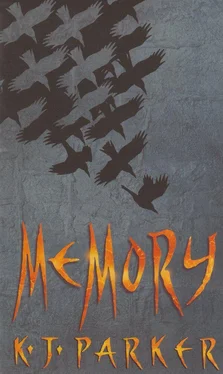K Parker - Memory
Здесь есть возможность читать онлайн «K Parker - Memory» весь текст электронной книги совершенно бесплатно (целиком полную версию без сокращений). В некоторых случаях можно слушать аудио, скачать через торрент в формате fb2 и присутствует краткое содержание. Жанр: Фэнтези, на английском языке. Описание произведения, (предисловие) а так же отзывы посетителей доступны на портале библиотеки ЛибКат.
- Название:Memory
- Автор:
- Жанр:
- Год:неизвестен
- ISBN:нет данных
- Рейтинг книги:5 / 5. Голосов: 1
-
Избранное:Добавить в избранное
- Отзывы:
-
Ваша оценка:
- 100
- 1
- 2
- 3
- 4
- 5
Memory: краткое содержание, описание и аннотация
Предлагаем к чтению аннотацию, описание, краткое содержание или предисловие (зависит от того, что написал сам автор книги «Memory»). Если вы не нашли необходимую информацию о книге — напишите в комментариях, мы постараемся отыскать её.
Memory — читать онлайн бесплатно полную книгу (весь текст) целиком
Ниже представлен текст книги, разбитый по страницам. Система сохранения места последней прочитанной страницы, позволяет с удобством читать онлайн бесплатно книгу «Memory», без необходимости каждый раз заново искать на чём Вы остановились. Поставьте закладку, и сможете в любой момент перейти на страницу, на которой закончили чтение.
Интервал:
Закладка:
Carefully, just in case Xipho was watching, Ciartan looked sideways. She was sitting with her hands folded in her lap, looking straight ahead-not at the old fool, but at a space on the wall slightly above and to the right of his head. She'd been taking notes, because the lid was off her inkwell and she was holding her rather fine ivory-handled pen; but now the nib was dry. He realised he'd been watching her rather longer than was safe, and turned away before anybody noticed what he was doing.
'Time in the draw,' said the old fool, absent-mindedly picking at a tiny scab on the back of his left hand, 'is what separates the decision to act from the act itself. Let us call the decision to act, the past-because the decision arises out of things that have happened to us, a perceived danger, orders from an officer in battle, an insult or an incentive; therefore the decision is the past, and in our river analogy is represented by the source of the river. The act itself is the present, because it is substantive, positive; it constitutes the latest turn of events, until it is in turn superseded by another act. Accordingly, it represents the river lapping at our feet. The consequences of the act lie in the future-consequences that will, in due course, motivate further decisions and further acts, just as the present cools into the past, and the rain falls on the mountains. The draw, then: the draw is only the gap between the past and the present, and as such-logically speaking-it cannot and does not exist. Between the decision to Cut and the cut there can be no interval of delay-logically speaking.'
Ciartan yawned. Drivel time, he thought. Pity; up till then, the old fool had sounded like he was about to make some kind of sense.
'We are faced, then,' said Father Tutor, 'with a gap; a hole in nature. We confront something that isn't there, because it can't be there, but which we know is there, because we experience it every time we lay hand to hilt. To understand this paradox, let us consider the act of casting a statue in bronze. An image is carved out of wax or tallow and packed in clay or sand. Then the mould is heated, the wax melts and pours out through a drain hole, and leaves behind a gap, an absence. It has no substance, this gap or void; it can't be touched or held, it is merely a shape confined between two definitions. And yet, when the molten bronze is poured in, it takes on the shape left behind by the melted wax, imposing its will on the substantial material, even though itself it has no form. In other words, it's a process; a process confined between parameters, just like time, or the river; or, of course, the draw. In the act of casting, the gap, the process, is memory. In the river, the gap is water. In the draw-as should now be obvious, if you've been following at all-the gap is religion. If we could pour molten bronze into the gap between the decision to draw and the cutting of the flesh, we could cast for ourselves a perfect image of a deity-or, as the proponents of the Morevish heresy would assert, of Poldarn the Destroyer.'
Ciartan gave up. He'd tried resisting. He'd tried rubbing his eyes, kicking his own ankle, digging his nails into the palm of his hand. He'd done his best, but it was no bloody good. He apologised to the old fool under his breath, and closed his eyes.
'The Morevish heresy,' the skinny old crow repeated. (Was he still the old fool, or was he really a crow now? In which case this was just a dream.) 'We call it that, and certainly it has no place in the orthodoxy, rightly so given that its very premisses are idolatry. But we should consider it with an open mind, just as we looked more closely at the trite metaphor of the river. In the Morevish heresy, Poldarn the Destroyer visits our mortal world shortly before the destruction of all things; he comes from outside time, being an immortal god, and he comes on behalf of the past, since the destruction he brings is punishment for the wickedness of mankind-our sins being the source of the river, rising in the bad acts we have committed. But he has no memory of who he is or why he's here among us, or what he's come to do; past, present, future are all missing, and all that remains in their place is a gap, an empty space confined between parameters. Poldarn, in other words, represents the process. Poldarn is the draw-according, that is, to the people of Morevich. And here is a significant point; because, according to tradition, in the distant past when Poldarn first left this world, boarding the ship that would carry him away to the timeless islands in the far West-at that time, long ago, the people of Morevich didn't communicate one with another as we do, speaking out loud and listening to what we hear. Instead, they communicated directly, mind to mind, hearing each other's thoughts inside their heads, so that words were largely unnecessary. Which is how, it goes without saying, they were able to form the concept of Poldarn-because speech is also an intangible, a process confined between parameters, an empty gap that shapes matter. But the men of Morevich did what we claim is impossible: they eliminated the non-existent gap we call speech, and so could proceed directly, thought to thought. In Morevich, therefore, the draw is also possible
At precisely the moment when Ciartan fell asleep, Poldarn woke up -Because someone was shaking him by the shoulder and yelling in his ear, 'Get up, you idle bastard, or Banspati'll do his block.'
Poldarn crawled out through the wreckage of his dream like a man escaping from an overturned cart; all around him, in his mind, were splintered fragments of truth, like the flotsam from a shipwreck. Gain Aciava, younger but still basically the same-he'd looked older than his age as a boy, younger than he really was twenty years on. And Copis, Xipho Dorunoxy. He'd been in love with her then, that thunderstruck passion, that religion that strikes only when we're too young to know any better. And who else, who else had been in the classroom with them? Twenty or so students, but he'd not been paying attention. He had been paying attention, in a way, to the skinny old crow part of the time, and to the slender, bony, long-limbed girl, but apart from that he hadn't allowed his concentration to wander, and so he hadn't studied the other faces in the room, and so he'd missed the whole point of the lesson. Typical.
'What?' he mumbled.
'Meeting,' snarled the voice-some man he only knew by sight and didn't much like anyway. 'In the coalhouse, compulsory or else. They're all waiting for you. Move!'
Just as well I was so tired I fell asleep in my clothes, with my boots on, Poldarn thought.
On the way to the long, dark coalhouse Poldarn and his escort passed the casting yard where the mould stood, shrouded under a thick swathe of tanned hides to keep out the damp. He remembered: today was the day, everything was ready for the pour. After the final frantic preparations, he'd scuttled away to get a few hours' sleep while the scrap bronze was packed into the cupola and melted; four hours, maybe five. What time was it? And why the hell have a compulsory meeting? Either the metal was ready to pour, or it wasn't. Nothing to have a meeting about.
As Poldarn shuffled into the coalhouse, a hundred heads turned and scowled at him. Just what he needed.
'Right.' Banspati's voice, clearly at the very furthest reach of his rope. 'That's the lot, we're all here. Now listen up, all of you, this is really important.'
Nobody heckled, joked, or said a word. Why? Because they're frightened, Poldarn realised with a jolt of panic. Terrified. For the gods' sakes; I close my eyes for five minutes and suddenly the world's all different.
Banspati-standing on an upturned crate-was about to say something else, but he stopped and jumped down quickly, a man anxious to get out of the way. His place was taken by a short, stocky man with white hair and a big nose. Friendly sort of face, bright blue eyes. For some reason, Poldarn knew before the short man said a word that he was an army officer.
Читать дальшеИнтервал:
Закладка:
Похожие книги на «Memory»
Представляем Вашему вниманию похожие книги на «Memory» списком для выбора. Мы отобрали схожую по названию и смыслу литературу в надежде предоставить читателям больше вариантов отыскать новые, интересные, ещё непрочитанные произведения.
Обсуждение, отзывы о книге «Memory» и просто собственные мнения читателей. Оставьте ваши комментарии, напишите, что Вы думаете о произведении, его смысле или главных героях. Укажите что конкретно понравилось, а что нет, и почему Вы так считаете.












